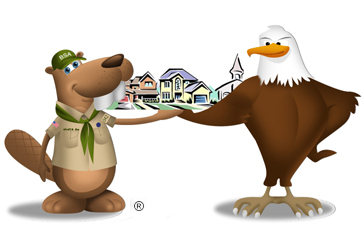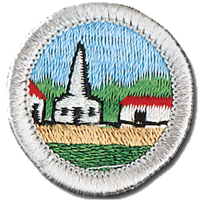Citizenship in the Community


Resources
Related
Citizenship in the Community Requirements
Current Scouts BSA requirements
as of February 19, 2026
as of February 19, 2026
1.
Discuss with your counselor what citizenship in the community means and
what it takes to be a good citizen in your community. Discuss the rights,
duties, and obligations of citizenship, and explain how you can demonstrate
good citizenship in your community, Scouting unit, place of worship, or
school.
2.
Do the following:
a.
Using an electronic mapping tool or paper map, locate and pinpoint the
following services and landmarks in your community. Determine and
record the distances from your home including driving time AND either
walking or biking time.
1.
Chief government buildings such as your city hall, county
courthouse, and public works/services facilities
2.
Fire station, police station, and hospital nearest your home
3.
Parks, playgrounds, recreation areas, and trails
4.
Historical or other points of interest
b.
Chart the organization of your local or state government. Show the top
offices and tell whether they are elected or appointed.
3.
Do the following:
a.
Attend an in-person meeting of your city, town, or county council or
school board, local court session; OR another state or local
governmental meeting approved in advance by your counselor.
b.
Choose one of the issues discussed at the meeting where a difference of
opinions was expressed, and explain to your counselor why you agree
with one opinion more than you do another one.
4.
Choose an issue that is important to the citizens of your community; then
do the following:
a.
Find out which branch of local government is responsible for this
issue.
b.
With your counselor's and a parent or guardian's approval, interview
one person from the branch of government you identified in requirement
4a. Ask what is being done about this issue and how young people can
help.
c.
Share what you have learned with your counselor.
5.
With the approval of your counselor and a parent or guardian, watch a movie
that shows how the actions of one individual or group of individuals can
have a positive effect on a community. Discuss with your counselor what you
learned from the movie about what it means to be a valuable and concerned
member of the community.
6.
List some of the services (such as the library, recreation center, public
transportation, and public safety) your community provides that are funded
by taxpayers. Tell your counselor why these services are important to your
community.
7.
Do the following:
a.
Identify three charitable organizations outside of Scouting that
interest you and bring people in your community together to work for
the good of your community.
b.
Pick ONE of the organizations you chose for requirement 7(a). Using a
variety of resources (including newspapers, fliers and other
literature, the internet, volunteers, and employees of the
organization), find out more about this organization.
c.
With your counselor's and your parent or guardian's approval, contact
the organization you chose for requirement 7(b), and find out what young
people can do to help. While working on this merit badge, volunteer at
least eight hours of your time for the organization. After your
volunteer experience is over, discuss what you have learned with your
counselor.
8.
Develop a public presentation (such as a video, slide show, speech, digital
presentation, or photo exhibit) about important and unique aspects of your
community. Include information about the history, cultures, and ethnic
groups of your community; its best features and popular places where people
gather; and the challenges it faces. Stage your presentation in front of
your counselor or a group, such as your patrol or a class at school.